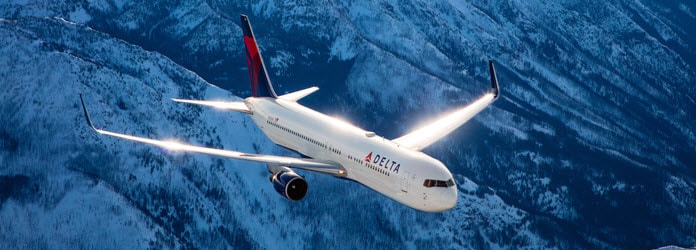
- Sustainable Planet -
- 4mins -
- 47 views
Delta commits $1 billion to become first carbon neutral airline
Delta Air Lines CEO Ed Bastion announces the carrier will go ‘fully carbon neutral’ next month.
Delta to become first “carbon neutral” airline
Delta Airlines is spending $1 billion over the next decade to essentially cancel out all of its future greenhouse gas emissions beginning next month, the company CEO announced last Friday. Starting March 1, 2020, Delta Air Lines will commit $1 billion over the next 10 years on its promise to mitigate all emissions from its global business from now on. The airline say they will invest in driving innovation, advancing clean air travel technologies, accelerating the reduction of carbon emissions and waste, and establishing new projects to mitigate the balance of emissions.

Delta has made environmentally conscious moves in the past but will still rely on jet fuel
Delta Air Lines CEO Ed Bastian announced on CNBC last Friday that the company is going “fully carbon neutral” starting 1 March 2020. “It’s a big challenge and it’s a big commitment,” Bastian told the news channel. He added. “There’s no greater challenge that I know of that we need to be investing in and innovating in as environmental sustainability,” he said.
The company, which has made environmentally conscious moves in the past, will still rely on jet fuel.
“We will continue to use jet fuel for as far as the eye can see,” Bastian said. “We’ll be investing in technologies to reduce the impact of jet fuel, but I don’t ever see a future where we’ll eliminate jet fuel from our footprint.”
Bastian stressed the company won’t rely on carbon-offset programs, though it has purchased some in the past.
“Carbon offsets are not the solution, we need to be investing in projects that make a difference,” he said. “That’s not really helping our planet.”
Airlines account for roughly 2% of global carbon dioxide emissions, and many have set plans to achieve carbon-neutral growth from 2020.
Delta’s announcement on Friday is the largest such commitment. Delta’s move comes at a time when many companies are reducing their environmental footprint to combat climate change.
In January, Microsoft unveiled an ambitious green plan aimed at making the company “carbon negative” this decade. By 2050, the company hopes to have removed as much carbon dioxide from the atmosphere as it’s emitted since being founded in 1975.
Source: CNBC
What are carbon offsets and what does Delta’s promise mean in real terms?
Delta is the world’s biggest airline by revenue, and this news is the latest in a rapidly growing trend of corporations announcing climate-change goals in response to public and investor pressure. — reported Axios last week.
Delta is able to immediately become carbon-neutral by purchasing what are called carbon offsets: These are financial transactions that ostensibly help cancel out carbon emissions by preventing emissions elsewhere in the world, like planting trees or supporting renewable energy.
The company isn’t disclosing how many offsets it’s purchasing — or how much it’s spending on that. But it’s likely to be a huge number given the scale of its announcement.
When Delta announced in 2012 it was capping its emissions at the levels current to that year, it purchased more than 16 million offsets.
Delta is the 8th most energy-efficient airline out of a study of 11, mainly due to its older fleet of airplanes that are less efficient than new models, but it’s in the process of replacing them. That’s according to a recent report by the nonprofit International Council on Clean Transportation.
Delta says it’s going to minimise its reliance on carbon offsets, though it also concedes technologies enabling it to directly reduce its emissions aren’t readily available or in some cases even invented yet. It plans to research those technologies and others with its new allocation of $1 billion.
"We are on a journey, and though we don’t have all the answers today, we know that our scale, along with investments of time, talent and resources will bring meaningful impact to the planet and ensure the sustainability of our business for decades to come."
— Ed Bastian, Delta CEO
Virtually all airlines rely on carbon offsets to cut their emissions. That’s because no commercially available technology exists to affordably make large quantities of low-carbon or zero-carbon jet fuel, whether battery-powered or another kind of liquid like biofuels.
JetBlue announced earlier this year it was going to become carbon neutral by July. Other airlines with commitments include Air France (cutting emissions per passenger by 50% in 10 years) and Australian carrier Qantas (net-zero emissions by 2050), per Travel Market Report.
However: Carbon offsets are, at best, "very opaque and definitely hard for the average person to understand," said Sola Zheng, an expert on aviation at the nonprofit International Council on Clean Transportation.
The quality of offsets also faces scrutiny. Doubt persists about whether offsets purchased actually reduce emissions and don’t just throw money at projects, such as planting trees or building a wind farm, that would have happened regardless.
A United Nations organisation is working on developing standards to ensure quality offsets in an industry-wide program, but no uniform quality-control measures exist for carbon offsets airlines and others purchase, besides disparate third-party programs.
In the meantime, we can do our part by flying less. See below for 8 great tips on how to give our planet a break.
Source: Axios.com

